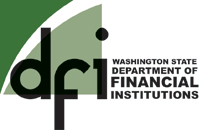
Summer 2019 Newsletter
From the Field – Common Exam Findings
The following are some of the more common violations our exam teams in each industry found during examinations in the last quarter:
- Money Services Business Program
- Mortgage Originations - Mortgage Broker
- Mortgage Originations - Consumer Loan
- Mortgage Servicing
- Escrow Program
Money Services Business Program
The common violations are maintenance of permissible investment reports, information security, reporting of material changes, and reporting adverse or disciplinary actions. See below for a summary of these compliance areas.
- Maintenance of Permissible Investment Reports and Calculation of Average Outstanding Money Transmission Liabilities - Licensees are required to maintain monthly reports about permissible investments per RCW 19.230.170(c). These monthly reports about permissible investments must include the monthly calculation of the average daily transmission liability per WAC 208-690-085.
- Information Security - Licensees are required to establish certain specific policies and procedures to protect systems and sensitive data stored on those systems. This includes an information security program per WAC 208-690-240, privacy policies per WAC 208-690-260, notice to consumers of data breach per WAC 208-690-270, business resumption plan per WAC 208-690-280, and records disposal policy per WAC 208-690-125.
-
Reporting of Material Changes - Licensees must report a material change through the NMLS within thirty business days of the change, per RCW 19.230.150(1). According to WAC 208-690-110 such changes include but are not limited to the following:
- A change of the licensee's physical, mailing, or email address. Additionally, a change to the physical, mailing, or emailing address of authorized delegates;
- A change of the responsible individual, AML compliance officer, executive officers or board members, or other person in control;
- A change of the licensee's name or DBA (doing business as) name;
- A change in the location of records required to be retained under RCW 19.230.170;
- Having a license revoked or surrendering a license in any other jurisdiction;
- The conviction of an executive officer, responsible individual, board director, AML compliance officer, principal, or other person in control, for a misdemeanor or gross misdemeanor involving a financial transaction;
- A change in a business bank account including closure, or a change in the location or identity of the bank holding the account;
- A change in the business plan from that submitted at application;
- Other similar activities or events affecting the business, executive officers, or other persons in control;
- Reporting of an Adverse or Disciplinary Action - Licensees must report an adverse or disciplinary action to the department within one business day after the licensee has reason to know of the occurrence as required by RCW 19.230.150(3).
Examinations of Check Cashers continue to see findings related to maintaining proper accounting records. See below for a summary this compliance area.
- Amount of checks cashed;
- Amount of fees charged for cashing checks;
- Amount of cash deducted from the transaction for the sales of other services or products;
- A cash reconciliation summarizing each day's activity, and reconciling cash on hand at the opening of business to cash on hand at the close of business. Such reconciliation must separately reflect cash received from the sale of checks, redemption of returned items, bank cash withdrawals, cash disbursed in cashing of checks, cash disbursed in making small loans, cash received in payment of small loans, and bank cash deposits.
Mortgage Originations
-
Mortgage Brokers
- Late MCR and FC filings – Quarterly filings are due 45 days after the end of the quarter, and FC reports are due 90 days after the end of the Company fiscal year end as reported in the NMLS.
- Incomplete and inaccurate MCR and FC filings – Some examples include MCR loan activity does not correspond to reported activity on the loan list or annual revenue figures do not match those submitted quarterly by the company.
- Advertisements – Online advertisements do not contain the Company license number and license name. MLO’s identified by name in advertisements do not have their individual license number in the ad. Prohibited phrases such as “best” and “lowest” used to describe rates and fees.
- Anti-Money Laundering Program – Mortgage Brokers are required to have an AML program that is specific to their business model and risk. The Company must follow their developed policy.
-
Consumer Loan
- Late MCR and FC filings – Quarterly filings are due 45 days after the end of the quarter, and FC reports are due 90 days after the end of the Company fiscal year end as reported in the NMLS.
- Incomplete Rate Lock Agreements – Rate lock agreements must state if the rate is guaranteed or not, and if guaranteed by a Company other than yours, you must name the Company.
- Incomplete Closing Disclosures – Examples include failing to include real estate commissions, failing to include the license numbers for real estate agents, and failing to correctly disclose “Additional Information About This Loan” based on the specific loan type chosen by the borrower.
- Incomplete Privacy Policies – Companies are not using the model form correctly. It must have a last revision date, correctly disclose the Company’s sharing practices in the table, and must have definitions completed on page 2 of the document.
- Adverse Action Notices – Federal Regulators listed at the bottom of the notice are often missing or incorrect when listed. The correct regulator to list on the document is the Federal Trade Commission.
Mortgage Servicing
- Failure to provide accurate annual assessments - Even with the adopted electronic system of filing annual assessment reports, the examinations are still revealing numerous inaccuracies, including under reporting.
- Failure to maintain records - Many of the issues stem from miscommunication between master and sub servicers, and with third-party documentation, especially with trustees handling foreclosures.
- Misapplying payments - This involves servicers either failing to comply with the borrower’s intent on allocating extra payment amounts, posting payments to the wrong account, or holding regular payments in suspense for more than one day.
Escrow Program
There were no common violations cited. However, we are seeing more nonnumeric Closing Disclosure issues. For example, an escrow company is named as the title company and the escrow fees are being charged to the CD under the title company’s name. We think this may be due to several out-of-state exams we conducted, where the out-of-state escrow companies acted as title companies nationally.

 We Want Newsletter Feedback:
We Want Newsletter Feedback: